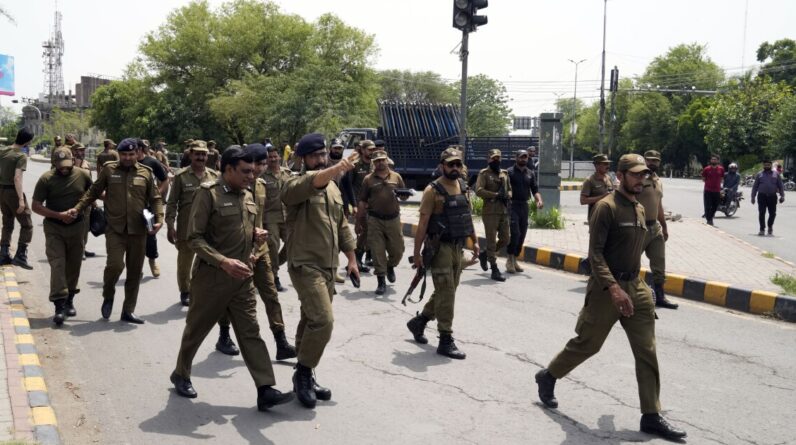
ISLAMABAD – Pakistani security forces surrounded the home of former Prime Minister Imran Khan in Lahore on Thursday, in a new escalation of a political crisis that has gripped the country for more than a year.
The action by security forces came after Punjab’s caretaker information minister Amir Mir demanded that Khan release dozens of “terrorists“alleged that Khan harbored: Protesters authorities believe are among those who vandalized and set fire to army facilities last week. Their actions were part of an unprecedented display of anger after that paramilitary forces arrested Khan last Tuesday from a court He was released last Thursday after the Supreme Court ruled that his detention was illegal.
The government announced a 24-hour deadline for Khan to release the wanted individuals, which expired at 2:00 p.m. Pakistan time (5:00 a.m. ET) on Thursday. When that deadline passed, Khan invited reporters into his large compound to film whatever happened.
Speaking to NPR via Zoom, he said he believed those forces intended to arrest him, or even kill him, a claim he has made repeatedly in recent days. But he said he would not go into exile. “This is where I will live and die. I will be here until my last breath. There is no doubt that I will leave my country.”
Pakistan has been in crisis since April last year, when the army signaled it no longer supported Khan’s government and it lost a no-confidence vote in Parliament. The military is Pakistan’s most powerful institution, and was widely seen as having propelled Khan to power.
Since then, Khan has fought back with street protests, court challenges and communicating with fans on social media. He is calling for early elections, which analysts say he would likely win.
But Khan is embroiled in dozens of criminal cases, including serious allegations of corruption. If found guilty, he will likely be disqualified from running for office again. Khan told NPR that he believed that was the point. He repeated a claim he has often made that Pakistan’s army chief, General Asim Munir, and the ruling coalition are trying to remove him politically. “He along with this 12-party coalition have decided that whatever happens, Imran Khan cannot win the election,” he said.
In response, Pakistan’s Defense Minister Khawaja Asif told NPR that Khan’s “engagement with [the] state, their engagement with Pakistan … depends on their status in government.”
Referring to Khan’s supporters who attacked military compounds last week, Asif said: “They have attacked the state of Pakistan. This is not political agitation or political protest. It is a protest against the state.” He continued: “Army installations, army headquarters and air bases are being attacked by the Indians, by our enemies on the border. They have never been attacked by the Pakistanis. [before].”
Pakistan’s military said earlier this week that some protesters would be tried in secret military courts, a prospect that has raised human rights concerns and led to the conviction of some parliamentarians.
Security forces have also stepped up their crackdown on Khan’s supporters and senior advisers. Some, after being released on bail, walked out of court and were re-arrested. “It’s a total banana republic right now,” Khan told NPR. “We’re headed for full martial law.”
The defense minister insisted that Khan’s supporters and advisers were being treated fairly. He said he was not in favor of negotiations with Khan to end the crisis.
Pakistan’s military spokesman has so far not spoken directly to the media.
A prominent analyst blames the country’s current crisis on the army, for interfering in the country’s political system.
“This is entirely the responsibility of the military,” says Mosharraf Zaidi, a columnist who runs a think tank, Tabadlab. Ticking off a long list of times the military stepped in to boost politicians’ fortunes, only to come after them later, he said: “This is something the military will have to seriously consider what it’s doing.”
Copyright 2023 NPR. To see more, visit
[ad_2]
Source link





